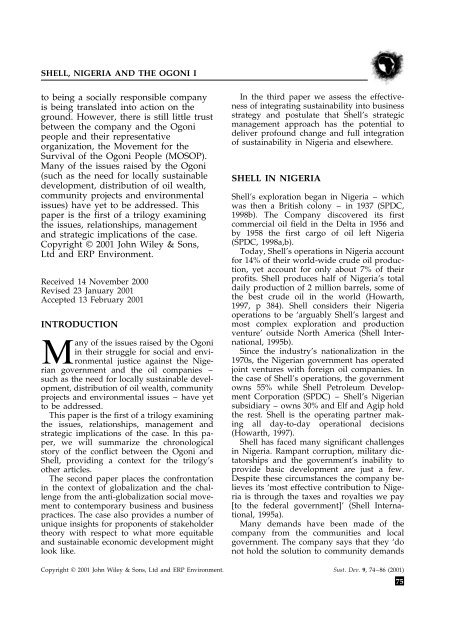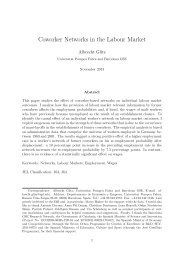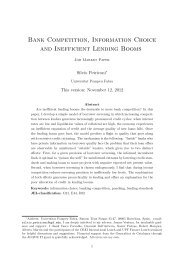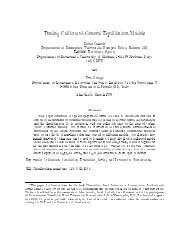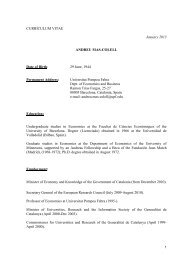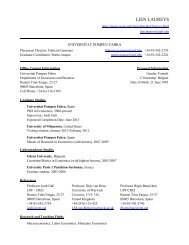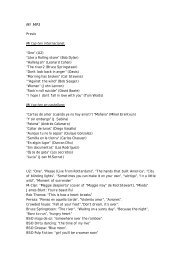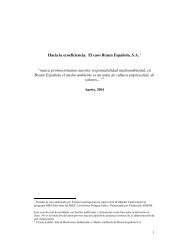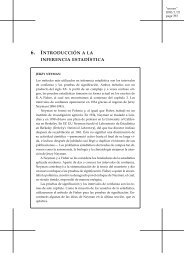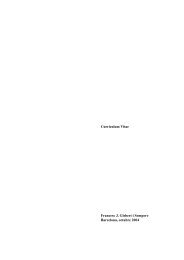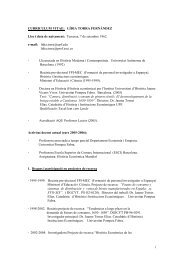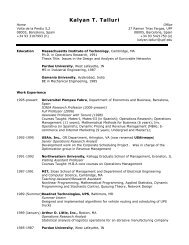SHELL, NIGERIA AND THE OGONI. A STUDY IN UNSUSTAINABLE ...
SHELL, NIGERIA AND THE OGONI. A STUDY IN UNSUSTAINABLE ...
SHELL, NIGERIA AND THE OGONI. A STUDY IN UNSUSTAINABLE ...
You also want an ePaper? Increase the reach of your titles
YUMPU automatically turns print PDFs into web optimized ePapers that Google loves.
<strong>SHELL</strong>, <strong>NIGERIA</strong> <strong>AND</strong> <strong>THE</strong> <strong>OGONI</strong> I<br />
to being a socially responsible company<br />
is being translated into action on the<br />
ground. However, there is still little trust<br />
between the company and the Ogoni<br />
people and their representative<br />
organization, the Movement for the<br />
Survival of the Ogoni People (MOSOP).<br />
Many of the issues raised by the Ogoni<br />
(such as the need for locally sustainable<br />
development, distribution of oil wealth,<br />
community projects and environmental<br />
issues) have yet to be addressed. This<br />
paper is the first of a trilogy examining<br />
the issues, relationships, management<br />
and strategic implications of the case.<br />
Copyright © 2001 John Wiley & Sons,<br />
Ltd and ERP Environment.<br />
Received 14 November 2000<br />
Revised 23 January 2001<br />
Accepted 13 February 2001<br />
<strong>IN</strong>TRODUCTION<br />
Many of the issues raised by the Ogoni<br />
in their struggle for social and environmental<br />
justice against the Nigerian<br />
government and the oil companies –<br />
such as the need for locally sustainable development,<br />
distribution of oil wealth, community<br />
projects and environmental issues – have yet<br />
to be addressed.<br />
This paper is the first of a trilogy examining<br />
the issues, relationships, management and<br />
strategic implications of the case. In this paper,<br />
we will summarize the chronological<br />
story of the conflict between the Ogoni and<br />
Shell, providing a context for the trilogy’s<br />
other articles.<br />
The second paper places the confrontation<br />
in the context of globalization and the challenge<br />
from the anti-globalization social movement<br />
to contemporary business and business<br />
practices. The case also provides a number of<br />
unique insights for proponents of stakeholder<br />
theory with respect to what more equitable<br />
and sustainable economic development might<br />
look like.<br />
In the third paper we assess the effectiveness<br />
of integrating sustainability into business<br />
strategy and postulate that Shell’s strategic<br />
management approach has the potential to<br />
deliver profound change and full integration<br />
of sustainability in Nigeria and elsewhere.<br />
<strong>SHELL</strong> <strong>IN</strong> <strong>NIGERIA</strong><br />
Shell’s exploration began in Nigeria – which<br />
was then a British colony – in 1937 (SPDC,<br />
1998b). The Company discovered its first<br />
commercial oil field in the Delta in 1956 and<br />
by 1958 the first cargo of oil left Nigeria<br />
(SPDC, 1998a,b).<br />
Today, Shell’s operations in Nigeria account<br />
for 14% of their world-wide crude oil production,<br />
yet account for only about 7% of their<br />
profits. Shell produces half of Nigeria’s total<br />
daily production of 2 million barrels, some of<br />
the best crude oil in the world (Howarth,<br />
1997, p 384). Shell considers their Nigeria<br />
operations to be ‘arguably Shell’s largest and<br />
most complex exploration and production<br />
venture’ outside North America (Shell International,<br />
1995b).<br />
Since the industry’s nationalization in the<br />
1970s, the Nigerian government has operated<br />
joint ventures with foreign oil companies. In<br />
the case of Shell’s operations, the government<br />
owns 55% while Shell Petroleum Development<br />
Corporation (SPDC) – Shell’s Nigerian<br />
subsidiary – owns 30% and Elf and Agip hold<br />
the rest. Shell is the operating partner making<br />
all day-to-day operational decisions<br />
(Howarth, 1997).<br />
Shell has faced many significant challenges<br />
in Nigeria. Rampant corruption, military dictatorships<br />
and the government’s inability to<br />
provide basic development are just a few.<br />
Despite these circumstances the company believes<br />
its ‘most effective contribution to Nigeria<br />
is through the taxes and royalties we pay<br />
[to the federal government]’ (Shell International,<br />
1995a).<br />
Many demands have been made of the<br />
company from the communities and local<br />
government. The company says that they ‘do<br />
not hold the solution to community demands<br />
Copyright © 2001 John Wiley & Sons, Ltd and ERP Environment. Sust. Dev. 9, 74–86 (2001)<br />
75


